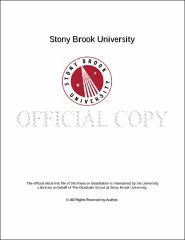| dc.identifier.uri | http://hdl.handle.net/11401/76603 | |
| dc.description.sponsorship | This work is sponsored by the Stony Brook University Graduate School in compliance with the requirements for completion of degree. | en_US |
| dc.format | Monograph | |
| dc.format.medium | Electronic Resource | en_US |
| dc.language.iso | en_US | |
| dc.publisher | The Graduate School, Stony Brook University: Stony Brook, NY. | |
| dc.type | Dissertation | |
| dcterms.abstract | This dissertation addresses the problem of conflating the conditions of experience with the given of experience. The conditions of experience are by definition not contents of experience. There are ideal conditions and material conditions, which we find studied respectively in transcendental idealism and the neurosciences. The given of experience is a search towards originary experiences. This conflation between condition and given also confuses the distinction between the ground of experience, which is transcendental, and the foundation of experience, which is immanent. This confusion rises to the forefront of philosophical discourse when Deleuze calls his position ‘transcendental empiricism.’ I ask the question, “What does transcendental empiricism mean?†My answer is that it is not a meaningful phrase. Based on an account of Descartes’ epistemological foundation, the response to Descartes by British empiricism, and Deleuze’s appropriation of Hume’s empiricism, I show empiricism to be a practice that excludes and undermines the transcendental in order to reveal the purely empirical. I support this answer by constructing an historical narrative of early modern philosophy that relies upon extensive citations and a documented assessment of Deleuze’s appropriation and defense of Hume’s empiricism. In the process of critiquing ‘transcendental empiricism,’ empiricism comes to be understood as a questioning that destabilizes already existing and generally accepted theoretical structures and categories of representation. | |
| dcterms.available | 2017-09-20T16:50:47Z | |
| dcterms.contributor | Casey, Edward S | en_US |
| dcterms.contributor | Cormier, Harvey | en_US |
| dcterms.contributor | Edwards, Jeff | en_US |
| dcterms.contributor | Lawlor, Leonard. | en_US |
| dcterms.creator | Kravet, Scott Leigh | |
| dcterms.dateAccepted | 2017-09-20T16:50:47Z | |
| dcterms.dateSubmitted | 2017-09-20T16:50:47Z | |
| dcterms.description | Department of Philosophy | en_US |
| dcterms.extent | 171 pg. | en_US |
| dcterms.format | Monograph | |
| dcterms.format | Application/PDF | en_US |
| dcterms.identifier | http://hdl.handle.net/11401/76603 | |
| dcterms.issued | 2016-12-01 | |
| dcterms.language | en_US | |
| dcterms.provenance | Made available in DSpace on 2017-09-20T16:50:47Z (GMT). No. of bitstreams: 1
Kravet_grad.sunysb_0771E_12843.pdf: 1505983 bytes, checksum: 7b9f311f674dc8bea7635d49a7b3941f (MD5)
Previous issue date: 1 | en |
| dcterms.publisher | The Graduate School, Stony Brook University: Stony Brook, NY. | |
| dcterms.subject | Philosophy | |
| dcterms.subject | Deleuze, Empiricism, Hume, Subjectivity | |
| dcterms.title | Defusing Transcendental Empiricism: Deleuze, Hume, and Empiricism | |
| dcterms.type | Dissertation | |

